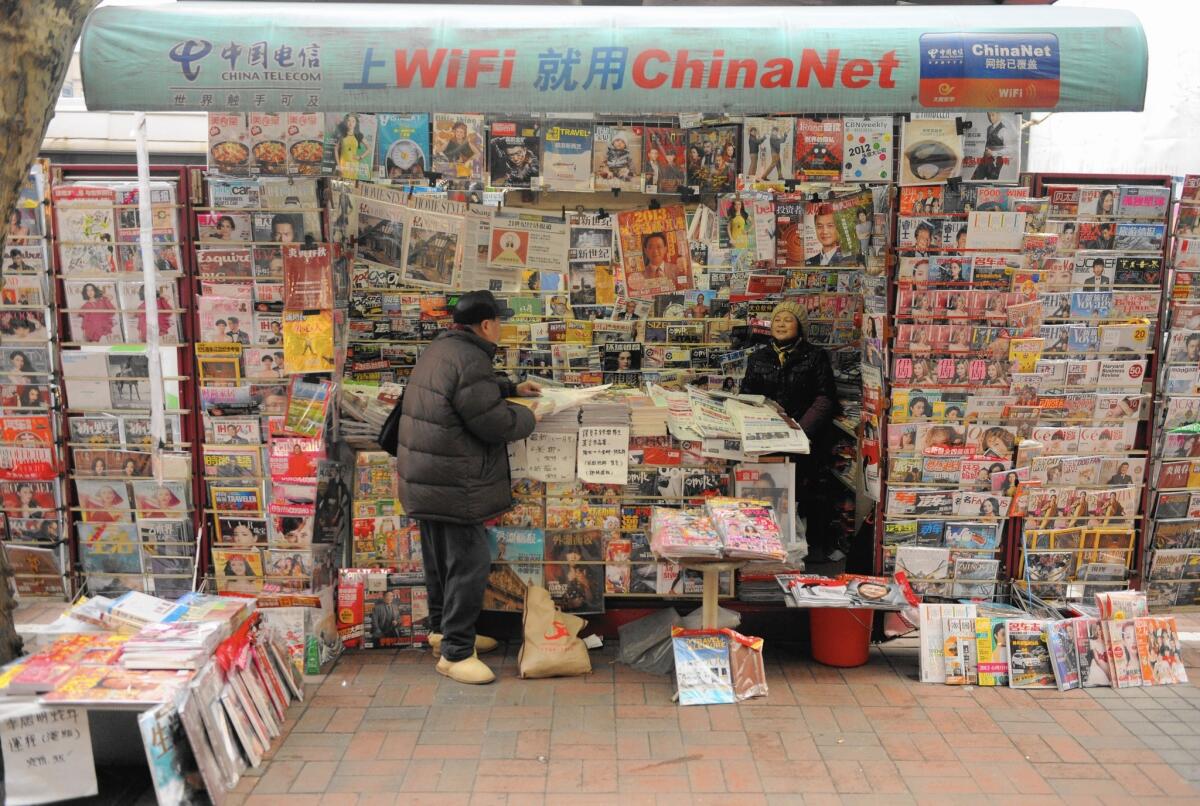Leaving China? Your books, maps and DVDs may be confiscated

reporting from Beijing — An odd thing happened when movers came to box up Ruth Kirchner’s furnishings as she was preparing to return to Berlin after a decade in China. The chief packer made a beeline for the German journalist’s globe to see whether it was politically correct.
“Where’s Taiwan?” he asked, checking whether the island — which has de facto independence but which China’s communist leaders regard as a breakaway province — was rendered in a different color than the mainland. Next he demanded: “Where are the Diaoyu islands?” referring to uninhabited specks of land long administered by Japan but claimed by China.
“I said, ‘Oh, come on, man, the Diaoyu islands are too insignificant to be shown on a globe,’” Kirchner recalled of the summer incident.
Finally, the packer picked up a road atlas of Britain and asked where Taiwan was. “I said, ‘That’s a road map of England; there is no Taiwan in there!’” Kirchner said. Satisfied, the packers completed the job; Kirchner flew back to Europe.
“I didn’t really think about it much; I thought he was just a bit strange,” she said.
Weeks later, though, Kirchner’s moving company called to say that customs authorities inspecting her shipment found a book that included an objectionable Taiwan map. Kirchner had to sign a form saying she was “voluntarily” abandoning the book — “The Opium War,” by Julia Lovell — even though she had bought it in Beijing. (The title recently has been taken off shelves in the city because of the map issue, booksellers say.)
“I sort of laugh about it, but I find it rather sad that they get so worked up about something so insignificant,” said Kirchner, adding that the controversy resulted in a monthlong delay for her entire shipment. “For one thing, I was taking things out of China, not in. And I brought lots of stuff in [that was presumably more sensitive] and they never seemed to care.”
NEWSLETTER: Get the day’s top headlines from Times Editor Davan Maharaj >>
::
In the last year, China has significantly stepped up border controls to prevent the import of banned materials, particularly Chinese-language books published in free-speech havens such as Hong Kong and Taiwan. But less well known are efforts by Chinese authorities to confiscate books, maps, globes, DVDs and any printed material they deem objectionable from people departing the mainland.
The extent of the effort remains unclear, but interviews with multiple moving companies in Beijing and more than a dozen foreigners who have left Beijing since 2013 indicate the practice has intensified. The confiscations suggest a growing sensitivity toward any printed or audiovisual material that bears even the slightest whiff of deviation from the party line on territorial issues.
“Regimes that are anxious about their legitimacy fetishize the signs of legitimacy,” said Tim Brook, a professor of Chinese history at the University of British Columbia and author of “Mr. Selden’s Map of China,” a book about an East Asia map from the 1600s. “So one of the signs of legitimacy is a map — there you are one color, your borders are all drawn properly and you look like a proper state.”
China does not publish lists of banned books, films, songs or maps. Instead, regulations state that no one may bring in or export materials that “harm national unity, sovereignty and territorial integrity; endanger national security or harm national honor and interests; attack the Communist Party of China; undermine national unity; promote cults and superstition; disrupt social order or undermine social stability.”
Also banned is the removal of state secrets and “anything else national authorities decide violates the exit ban.”
The broad wording gives officials wide latitude to decide on the spot what is forbidden and what is not. A woman who answered the phone at China’s customs hotline, when asked for a list of books and maps barred from export, repeatedly referred to the general regulations and said, “You decide. You just read the rules and decide.” She refused to give her name.
An assistant general manager at the moving company SAE Asia, Sabrina Wang, said “anything against Chinese leaders or about politics” could present problems. Other companies including Allied Pickfords and Links offered similar information.
Stephanie Ho, former Voice of America bureau chief in Beijing, said when she was leaving the city this year, packers for Sino Santa Fe pulled out a dozen books they thought might not pass muster.
Some were not surprising, like Geremie Barme’s “New Ghosts, Old Dreams: Chinese Rebel Voices,” and “Chairman Mao Would Not Be Amused,” a collection of Chinese fiction by various authors with a cover of Mao in pigtails. But others were freely available in China, such as a biography of Deng Xiaoping written by his daughter.
“They said they were just worried about the huge picture of him,” Ho said. “The customs officials must have the most amazing library in all of Beijing, full of banned books that they snag on the way in and, to my surprise, on the way out,” she said, laughing. “They either have an amazing library or someone is getting rich selling them to people who can’t otherwise get them.”
SIGN UP for the free Great Reads newsletter >>
::
Expatriates who have been living in China since the 1990s say they had never heard of such outbound seizures occurring regularly until recently. But history professor Brook opens his 2013 book by recalling how Chinese border guards confiscated a map from him in 1976 as he was crossing into Vietnam.
In Brook’s case, the map was printed by a state-run Chinese press and openly sold in China, and it showed China’s sovereignty extending throughout the South China Sea — a provocative claim that remains the source of severe tension with neighbors including Vietnam, Malaysia and the Philippines. Authorities told Brook that taking it out of China was a matter of “national security.”
The sensitivity, Brook speculates, may serve to have reflected China’s geopolitical weakness at the time. “Maybe they felt like they weren’t in a position to release their understanding of the borders, because they didn’t want the other states to know where they thought the borders were,” he said.
(Ironically, Brook’s Chinese publisher requested the map confiscation be excised before his book could be printed in China.)
Today, a confident China is increasingly bold about its territorial claims; it’s engaging in extensive island-building in the South China Sea on disputed islets and repeatedly sending coast guard vessels into waters around the Diaoyu islands (called the Senkaku by Japan). Now, it’s putting out its own maps — and seizing those it doesn’t like.
Mark Stone, a correspondent for Sky News, left China in the summer and had to part with a globe depicting Taiwan as an independent country. Christine Adelhardt, a reporter for the German broadcaster ARD, said she was forced to abandon two books determined to be “against the Chinese government”: Chan Koonchung’s sci-fi novel “The Fat Years” and Jonathan Fenby’s “History of Modern China: The Fall and Rise of a Great Power.”
Jack Chang, a former Associated Press reporter in China who moved to Sacramento during the summer, said customs seized Jung Chang’s “Mao: The Unknown Story” from his shipment, which he had hand-carried into China without incident.
“You think they would want that book to leave China,” he said. “Someone’s probably reading it now, or selling it.”
::
Wang, of SAE Asia, said reporters’ shipments often come in for particular scrutiny. “If they see your journalist visa” in your paperwork, she said, “they will check your boxes.”
Chang said he believed every box in his shipment had been opened.
Another American journalist who left China this year said he became alarmed when movers notified him that customs had determined that he had “illegal documents” in his shipment. China has imprisoned Chinese journalists for possessing state secrets and leaking them to overseas news outlets; foreign reporters have been expelled on similar charges.
The reporter, who asked to not be identified for fear of jeopardizing future attempts to work again in China, said officials seized a Human Rights Watch report on China he had printed from the Internet, the Wikipedia entry on the 1989 Tiananmen Square massacre and a history DVD called “China: A Century of Revolution.” The reporter said he also believed that inspectors may have copied or photographed all his notebooks searching for information on his sources.
“It felt very intrusive,” he said, noting that he had taken pains to not record identifying details about his interviewees. “In some ways, it felt like an apt way to leave China, because you spend years in China being freaked out [about being monitored]; it’s good to know your precautions weren’t for nothing.”
Twitter: @JulieMakLAT
ALSO
Government’s handling of Hurricane Patricia is a rare bit of good news for Mexico
Whale-watching boat with 27 aboard sinks off Canada’s Vancouver Island; ‘multiple fatalities’
A paraglider sails from Israel to Syria -- and thereby hangs a mystery
More to Read
Sign up for Essential California
The most important California stories and recommendations in your inbox every morning.
You may occasionally receive promotional content from the Los Angeles Times.











